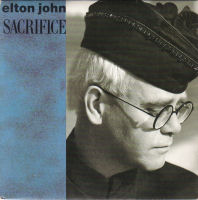Sacrifice (Elton John song)
| "Sacrifice" | ||||
|---|---|---|---|---|
 |
||||
| Single by Elton John | ||||
| from the album Sleeping with the Past | ||||
| A-side | "Healing Hands" (second release) |
|||
| B-side | "Love Is a Cannibal" (first release) |
|||
| Released | October 1989 (first release) May 1990 (second release) |
|||
| Format | CD, vinyl record (7" and 12"), audio cassette | |||
| Length | 5:11 | |||
| Label | Rocket, MCA | |||
| Writer(s) | Elton John, Bernie Taupin | |||
| Producer(s) | Chris Thomas | |||
| Elton John singles chronology | ||||
|
||||
"Sacrifice" is a ballad performed by musician Elton John. The lyrics are by Bernie Taupin and the music by John. The song appears on the 1989 album Sleeping with the Past. It was first released in October 1989, then in 1990, and was the second single from the album. It achieved success, particularly in France and the UK, where it became his first solo chart-topper, spending five weeks at the top.
"Sacrifice" is inspired both by the Aretha Franklin song "Do Right Woman, Do Right Man" and described as a Percy Sledge song by Elton John. The song is beloved by both John and Bernie Taupin and deemed a bookend of sorts to their first hit "Your Song". Taupin has said he is surprised he wrote it, and said in an interview, "I think 'Sacrifice' is one of the best songs we've written." The song is not a typical love song, but rather a song about a breakup of a marriage where the loss of the relationship is "no sacrifice."
Although the single was successful, Elton John did not tour Europe in both 1989–1990 to support the Sleeping with the Past album (with the exception of one appearance in Knebworth Park on 30 June 1990) touring only in the U.S. and Australia. The 1989 European tour was, instead, in support of the Reg Strikes Back album, with no material representing Sleeping with the Past. In all shows that were done to support Sleeping with the Past in 1989–1990, Elton played this song solo on his Roland RD-1000 Digital Piano.
The video, which follows the song's lyrics, portrays a man and woman having problems in their relationship after being married and raising a daughter. After they go their separate ways, the man raises his daughter alone. The video was directed by Alek Keshishian and it had Yasmeen Ghauri in it.
The version used in the promo video is slightly sped up compared to the album version. The result is a higher pitched vocal and shorter length time. The video was filmed in Los Angeles in 1989, and was the second video made after Elton rejected a version from Ken Russell.
...
Wikipedia
